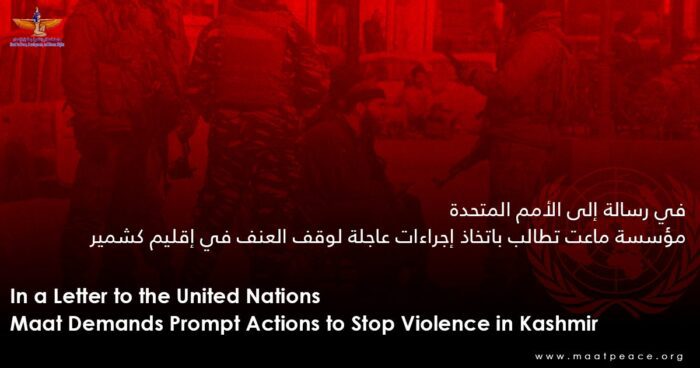On October 9, 2021, Maat for Peace, Development and Human Rights called on the UN member states to constitute a fact-finding mission or an independent investigative mechanism to investigate the incidents of violence in Kashmir, the contested region between India and Pakistan, in order to prevent more human rights violations against the inhabitants of the region and the opposition of the Indian government.
The Indian authorities had warned the adherents of all religions, except for Muslims, to immediately withdraw from Kashmir in preparation for a massive military campaign under the allegations of combating terrorism, after two teachers were killed in an attack on a school in the Delhi-controlled part of the contested Kashmir region by suspected anti-India armed men, as reported by the police.
According to press reports, India is leading a campaign of genocide against Muslims in Kashmir. The police forces in the region started expelling all Muslim residents from their homes, firing live bullets at Muslim neighborhoods and beating up all residents, in addition to killing a number of children. Furthermore, a number of armed men stormed a public school in Idgah district of Srinagar city. They killed the teachers, including the principal of the school, but none of the students was present at the scene during the attack. These developments took place two days after some armed men, belonging to the newly formed "Resistance Front”, launched three separate attacks within ninety minutes, killing three civilians, including a pharmacist.
Notably, the Muslim-majority Kashmir has been witnessing security tensions and a cycle of escalating violence since 2019, following the decision by India to abolish the region’s semiautonomous status, which raised fears among the inhabitants about the increasing numbers of new residents of the Hindu religion. Since then, serious abuses and violations of the international humanitarian law and the international human rights law have been reported during the ongoing conflict in the region. Furthermore, some human rights reports monitored details of widespread violations and violence against civilians, journalists and human rights defenders. Several journalists in Kashmir were arrested and interrogated by the Indian authorities, but most of them were not charged. In July 2021, four journalists were arrested from their homes, namely: Showkat Motta, Shah Abbas, Hilal Mir and Azhar Qadri for their religious and political affiliation as well as their connections and ties with Pakistan.
Accordingly, Maat urges the Indian government to stop using the pretext of fighting terrorism as a pretext to legitimize these serious human rights violations. Maat also emphasizes that the decision to form a fact-finding mission or an independent and multi-year investigative mechanism, with powers and resources, that takes into account the gender perspective, aims to monitor human rights violations and abuses committed by all parties in the region, regularly reports such violations and collects evidence is a crucial factor of a large-scale, necessary and urgent international response to address the escalating human rights and humanitarian crisis in Kashmir. This mechanism is necessary to ensure that the UN member states are fully aware of the situation on the ground, which allows them to make important decisions on addressing such crisis and help protect the rights and lives of Kashmiri citizens as well allowing the people of Kashmir the right to self-determination and preventing further crimes. This is in addition to complementing and supporting international and national action for accountability for crimes under international law.
Maat also requests the Commission of Inquiry to submit a report on its investigations, findings and recommendations regarding the human rights situation in Kashmir during the 49th session of the United Nations Human Rights Council (UNHRC). The report should include the potential violations of the international humanitarian law and international human rights law within the context of an enhanced interactive dialogue.
shortlink: https://maatpeace.org/en/?p=33887












